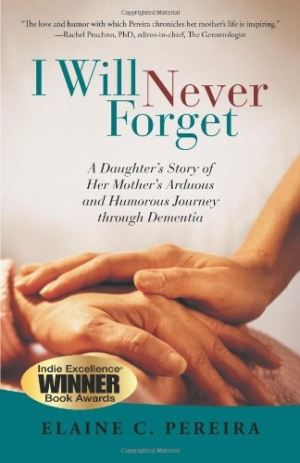I Will Never Forget
A Daughter's Story of Her Mother's Arduous and Humorous Journey through Dementia
Pereira’s moving memoir of dementia caregiving pays homage to her mother’s brave spirit and demonstrates the power of love.
Honest, intimate, and heartbreaking, Elaine C. Pereira’s I Will Never Forget is the story of a daughter whose strength and courage are tested as her mother’s mind is ravaged by dementia. Armed with love and the same feisty spirit her mother once displayed, Pereira learns to navigate the confusing maze of caregiving and the inner conflicts that arise from it as she assumes increasing responsibility for her fiercely independent mother.
Betty Ward was once a bright, capable, strong, and loving woman who lost two sons, one in a car accident and the other to cancer, and served as her husband’s caregiver when a stroke left him disabled. As she aged, however, Betty lost her memories, her judgment, and her ability to care for herself.
With artistry, Pereira weaves her childhood memories with those of her mother’s later years, giving intimate glimpses into the sometimes conflicted mother-daughter bond and revealing just how much of Betty’s bright spirit was lost as the disease took its toll. Especially poignant is the author’s revelation of the emotional stress she experienced in making decisions about what level of care was needed as her mother’s disease progressed, as well as when communicating with doctors, taking over her mother’s financial responsibilities, and coming to peace with painful end-of-life decisions and with her own failings as she did her best to cope.
As a retired school occupational therapist who worked with special-needs children, Pereira appears to possess some of the experience and patience needed to handle her mother’s increasingly bizarre and paranoid behavior. Nonetheless, she did not recognize the early signs of her mother’s decline. “It wasn’t just stress,” Pereira writes. “It was a warning sign. I held myself accountable for blowing off these cautionary concerns…I would always regret not addressing these issues earlier.” She admits to experiencing emotions many caregivers have difficulty confessing, even to themselves: wanting her mother’s suffering, and her own, to be over, and the uneasy guilt of weighing the costs of end-of-life care against inheritance issues. In doing so, she opens the door to frank discussions about how families handle end-of-life issues, and her sharing is both honest and disconcerting: “It was eerie to sign my name next to the Do Not Resuscitate line on behalf of my mom,” she writes, “but inexplicably, I never hesitated.”
Written in a conversational tone and not without humor, the book is a welcome addition to the literature on dementia and caregiving. The cover art is sensitive and attractive; the cover matter, both front and back, is well-designed and informative. The book’s few errors include instances of incorrect word choice and punctuation.
Pereira’s moving memoir pays homage to her mother’s brave spirit and demonstrates the power of love for other caregivers who stand by a dying loved one’s side and, at life’s end, release them with “no regrets.”
Reviewed by
Kristine Morris
Disclosure: This article is not an endorsement, but a review. The publisher of this book provided free copies of the book and paid a small fee to have their book reviewed by a professional reviewer. Foreword Reviews and Clarion Reviews make no guarantee that the publisher will receive a positive review. Foreword Magazine, Inc. is disclosing this in accordance with the Federal Trade Commission’s 16 CFR, Part 255.

